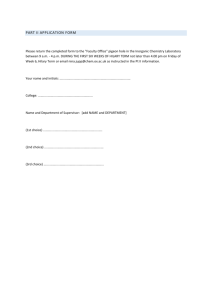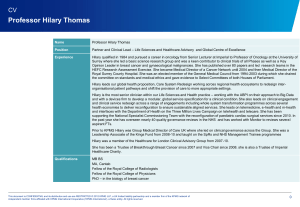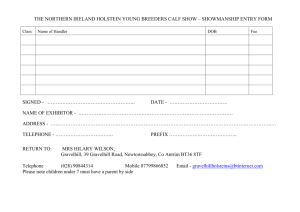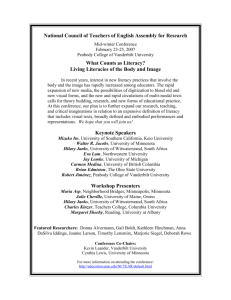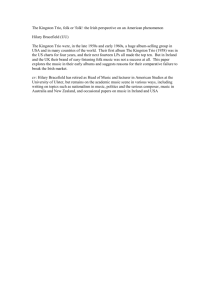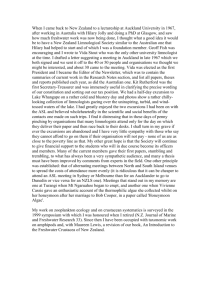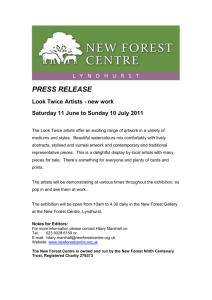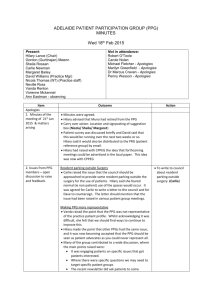Introduction to 'Research Studies'
advertisement
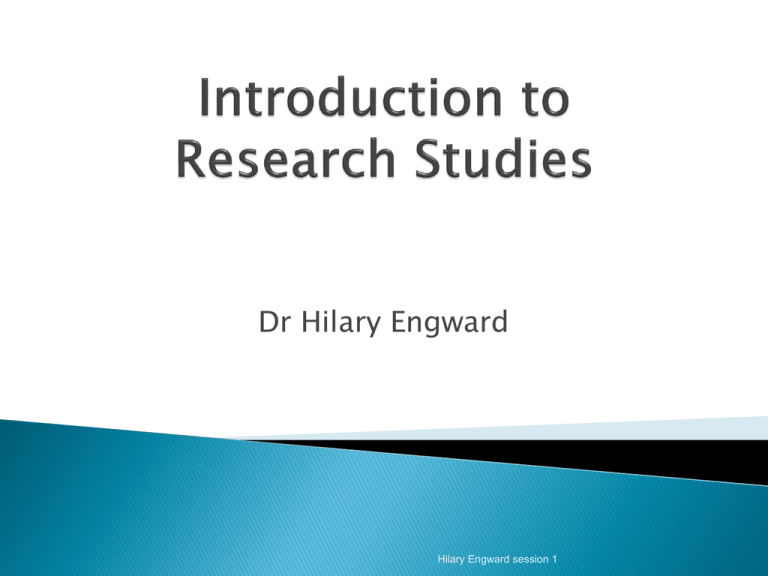
Dr Hilary Engward Hilary Engward session 1 Hilary Engward session 1 In twos: Write a definition of research Explain when you use research Do you question that research? 10 mins Hilary Engward session 1 To investigate thoroughly Research is a systematic methodical and ethical; research can help solve practical problems and increase knowledge What models of research have you heard/read about? Note – you will need to understand all in order to meet the learning outcomes Hilary Engward session 1 Review or synthesize existing knowledge Investigate existing situations or problems Provide solutions to problems Explore and analyse more general issues Construct or create new procedures or systems Explain new phenomenon Generate new knowledge …or a combination of any of the above! (Collis & Hussey, 2003) Hilary Engward session 1 Research can be approached in the following ways: Quantitative/Qualitative Deductive/Inductive Research projects can combine a number of approaches, e.g. may use both quantitative and qualitative approaches Hilary Engward session 1 Quantitative collecting and analysing numerical data; Questions tend to be interrogative to ask a question what is the relationship…….. It concentrates on measuring the scale, range, frequency etc. of phenomena. detailed and results can be collated and presented statistically. Qualitative Inquiry into social phenomena to discover patterns/relationships Subjective aspects of phenomena e.g. values, attitudes, perceptions. to describe and explain what is happening in relation to social participants. Detailed explanations of patterns in social phenomena Hilary Engward session 1 General Idea Particular Situation Particular is deduced from the general Deductive Particular Situation General Idea Particular to infer ideas/theories Inductive Hilary Engward session 1 A clear theoretical position prior to collection of data: definitions of ‘professional’ from literature/professional associations. You would then test this definition on a range of people, may be using a questionnaire/ structured interviews/group discussion. Select a sample of people on the basis of age, gender, occupation etc. The data gathered could then be collated and the results analysed and presented. This approach offers a relatively easy and systematic way of testing established ideas on a range of people. Deductive Approach start by talking to a range of people asking for their ideas and definitions of professional’ From these discussions (data) you could start to assemble the common elements/themes Then you might compare these with definitions from professional associations. might lead you to arrive at a new definition of the word – or it might not! Can be very time-consuming, but the reward might be a fresh way of looking at the subject. Inductive Approach Hilary Engward session 1 Research is not ‘neutral’, Positivist: Objectivist Interests, values, assumption s, aims, funding, context…. Interpretive: Subjectivist/ humanist/ phenomenological Hilary Engward session 1 methodology - the overall approaches & perspectives to the research Why you collected certain data What data you collected Where you collected it How you collected it How you analysed it (Collis & Hussey, 2003, p.55). Hilary Engward session 1 Positivistic Surveys Experimental Studies Longitudinal Studies Cross-sectional Studies Interpretive Case Studies Action Research Phenomology Ethnography Feminist Grounded Theory Systematic review (SR) Hilary Engward session 1 Research method refers only to the various specific tools or ways data can be collected and analysed questionnaire Interview observation Hilary Engward session 1 Hypothesis: statement of prediction/relationship between variables Null Hypothesis: statement of no relationship Epistemology - methodology Hypothesis Theory Null Hypothesis Method Findings (falsification) Epistemology: Positivist Methodology/method: experiment, survey, observation Analysis: numerical/statistical – descriptive or inferential (testing hypothesis •t test for differences between groups •Analysis of Variance (ANOVA) Hilary Engward session 1 •Analysis of Covariance (ANCOVA) Broad question – how do? Looks for patterns in data Open ended, exploratory Epistemology – methodology - method Research interest Data collection Pattern finding Formative theory Epistemology: interpretive Methodology: Grounded Theory, Phenomenology, Ethnography Methods: Observation, interview, case study Analysis: qualitative data analysis (QDA), content analysis. Thematic analysis, Hilary narrative Engward session 1 Styles of research are independent of professional boundaries……. Why? Hilary Engward session 1 Systematic Review (SR Hilary Engward session 1 Evidence that what you did caused what you observed In this study • What you do: • Method • What you see Observation • ?cause and possible alternatives But this does not tell you that this was what was intended to be observed – construct validity – more on this in later sessions Hilary Engward session 1 What is the focus of your potential research going to Literature – what's be??? known about your Measurement s of intelligibility: Reliability Research Episte Problem molog y research interest? Methodolo gy Method Sample Analysis Validity Trustworthin ess Transferabilit y Hilary Engward session 1 Findings Written assignment: 6,000 words Literature Review and Research Proposal Date of submission in MG Place of submission Electronic Submission via Grademark (see appendix 1 in module guide) Hilary Engward session 1 Research Process and Module Learning Outcomes Research interest LO1,2 &4 Review of Literature Very important for LO2 Philosophical or Epistemological Stance Very important for LO1 Choice of method LO1,2 &4 Choice of Methodology LO1,2 &4 H Engward research Studies lecture 1 Hilary Engward session 1 Research question/ Purpose LO1,2 &4 Research design LO1,2,3 &4 Ethics in Research Very important for LO3 21 Demonstrate a critical understanding of alternative epistemological perspectives relating to theory, design and analysis in research for health and social care, professional practice, regulation and policy Hilary Engward session 1 Critically analyse relevant literature to justify the significance of the proposed study and the appropriateness of the chosen research methodology Hilary Engward session 1 Critically debate the ethical issues related to research Hilary Engward session 1 Evaluate and apply the principles of research design and strategy to formulate a research proposal Hilary Engward session 1 Option A Research Proposal Option B Systematic Review Proposal Please refer to module guide for details and guidance. Please follow the structure of Option A and B as per module guide. Hilary Engward session 1 Follow the headings listed in the module guide p. 7: Title Abstract Introduction (rationale for proposed study) Literature Review Methodology Research Design Access and Ethical Issues Limitations Dissemination Reference list Appendices Hilary Engward session 1 Use the headings listed p. 10: Title Introduction (rationale for proposed study) Literature Review: this needs to include a scoping review. Methodology: Research Protocol Research Design Access and Ethical Issues Limitations Dissemination Reference list Appendices Hilary Engward session 1 The Literature Search allows a researcher to gain support for the research purpose/question and establishes a need to investigate an issue Essential in formulating a research question/hypothesis Essential for LO2 Hilary Engward session 1 A research proposal to investigate a specific, clearly stated, research problem. Your work should address the following: Reason/ rationale for investigation of the research problem. A background/ contextualization of the research topic. The design of the research, which demonstrates the logic linking of the methodological approach and research design appropriate to the research question. Methods selected for the collection of data and data analysis, with discussion as to their appropriateness over alternatives (strengths and limitations of the chosen approach). Ethical implications and procedures Reliability and validity/trustworthiness issues Suggestions for dissemination of findings and any potential implication for policy and practice. Hilary Engward session 1 Which option will you do: Option A: Primary Option B: SR What types of things might you look at? What are you interested in? Why? What is the problem? Hilary Engward session 1 Check your TT on E vision Access the VLE: Download Module Guide Access Turnitin Check library access. Consider booking a session with a librarian. E mail hilary.engward@anglia.ac.uk from your student account Check out my tutorial times and book in Hilary Engward session 1 Think about possible research areas – we will explore these next week (and every week) Read: Ridge, T., 2011. The everyday costs of poverty in childhood: A review of qualitative research exploring the lives and experiences of low-income children in the UK Children & Society, 25, pp 73-84 Look for an easy to follow, research textbook – see reading list for examples. Hilary Engward session 1
